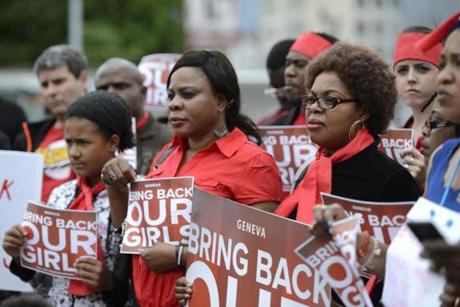Jun. 9 (GIN) – Is the social media campaign to bring back the abducted Nigerian schoolgirls an effective tool to win their freedom or just a novelty trending until the next big thing?
That’s the question heating up the news wires with rescue efforts at an apparent standstill and new dramas coming on the media stage.
Staff writer Joshua Keating in Slate.com was among the questioners. He compared #BringBackOurGirls to the #StopKony campaign of 2012. “Stop Kony was the most successful viral video in history and succeeded in making Joseph Kony and the Lord’s Resistance Army internationally famous,” he wrote.
But the video had flaws. “It not only fudged basic facts of geography and chronology, but failed to provide viewers with any social, political or economic context for Kony’s violence,” Keating said.
Kony, a notorious Ugandan warlord, abducted over 60,000 children from 1986 to 2009, making them into child soldiers or sex slaves. Still at large, Kony is the target of a manhunt by a small U.S.-led force. Most of the thousands of young Americans in that hashtag campaign have moved on.
Researchers who studied #StopKony, linked its success to the simplicity of its message – which was oversimplified.
A second Stop Kony video presented a more nuanced picture of Kony’s Africa. It failed to catch fire with the original hashtag followers.
“Defenders of campaigns like these claim they can be gateways toward greater understanding of complex global issues,” Keating said, but the opposite may be true.
“People are outraged when they hear about evil monsters like Kony or Boko Haram that just need to be stopped. When they learn more about the issue and find out that, lo and behold, killing the monster won’t be so easy and there are larger issues in play beyond the monster itself, they lose interest.”
Marissa Jackson, a blogger writing for The Guardian, disagreed. “I am not Nigerian and I have not known the pain of having a child abducted. Neither am I familiar with the group trauma experienced by the Chibok community, or the thousands of other Nigerians who have been devastated by Boko Haram’s unspeakable actions and further victimized by their government’s indefensible inaction.
“Yet I clicked and shared updates about the Chibok girls and the abusive antics of the president’s wife, Patience Jonathan, and I even used the hashtag #BringBackOurGirls a couple of times, feeling self-conscious about it.
“All too often, we protest too much and accomplish too little. But that’s not what’s been happening here.
“Rather, the movement to #BringBackOurGirls, which actually originated in Nigeria, has thus far demonstrated the virtues of solidarity and grassroots international cooperation, within and beyond the African diaspora. It has shed much meaningful light on how to make visibility and voice to the invisible and voiceless.
“As a black woman in the United States, this movement has become as meaningfully encouraging as it is frustrating because for the first time ever, I am witnessing men and women come together to notice when a group of black girls goes missing, and demand decisive action.
“Equally significant has been the pan-African unity on the issue. That people of West Indian and Caribbean, North American, Afro-European, and African descent have rallied in support of the Chibok girls, their families, and indeed, all of Nigeria, is no small feat.” w/pix of protestors at European headquarters of U.N. in Geneva








